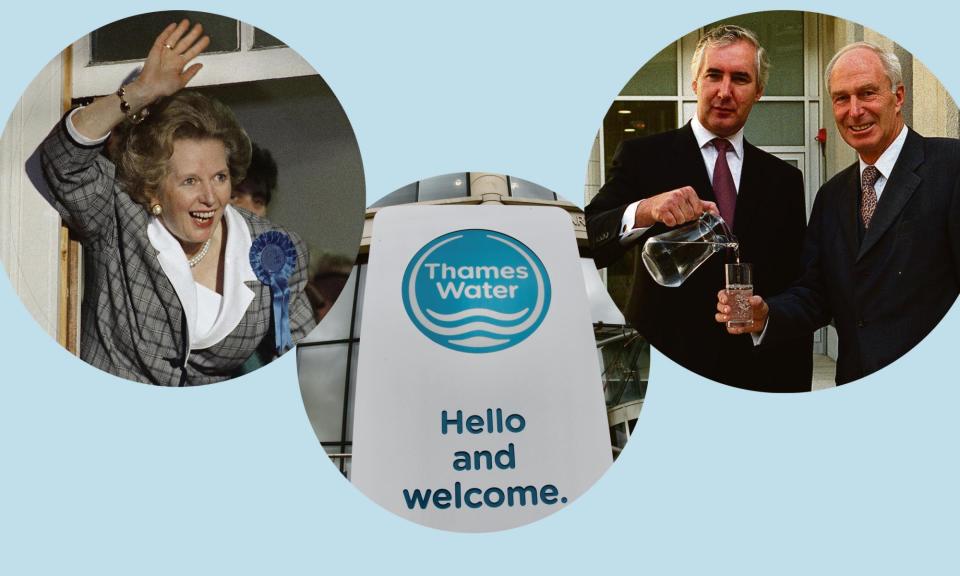What now for Thames Water as investors turn off the taps?

Thirty-five years ago, investors flocked to buy into the water industry, an essential public utility and a monopoly, in a sell-off by Margaret Thatcher which was deeply unpopular with the public, but saw shareholders gain 40%, on average, on the first day of trading.
Despite the £56bn paid out in dividends to shareholders in the sector since privatisation, today investors in the biggest beast, Thames Water, appear to be running for the hills.
The water industry has become a bad bet. Billions are required to fix pipes and treatment plants which have been left to rot for years, to invest in building resilience to the climate crisis, and to meet a tougher environmental regime – one arguably forced upon the regulator, Ofwat, by public outrage over sewage discharges.
Combine that with higher interest rates on the £18bn debt held by Thames and its parent company, more than half of which is index-linked, and the attractions of what was once considered a cash cow fade dramatically.
The nine owners of Thames Water appear to have had enough. There is talk among some of “not throwing good money after bad”, and of having to protect their own investors, as Thames struggles to repay debts and, according to insiders, faces a £4bn shortfall in revenue to the end of the decade.
On Thursday, the investors, which include the Canadian public pension fund Omers (Ontario Municipal Employees Retirement System), the UK’s University Superannuation Scheme, Abu Dhabi’s sovereign wealth fund and the Beijing-controlled China Investment Corporation, pulled the plug on a commitment to provide £500m of equity last week – part of a total of £3.25bn in extra cash the company is seeking – saying Ofwat’s intransigence made Thames “uninvestible”.
Their decision came a day after water companies came under fire for record raw sewage discharges into rivers and seas, which reached 3.6m hours in 2023.
Pulling the plug on the cash was a volte-face from the shareholders’ position last July, when they agreed to pump £500m into the company by the end of this month in the first injection of equity since privatisation, and promised another £1bn subject to conditions.
But since then investors have been in a long standoff with Ofwat, demanding that in return for providing billions to keep Thames functioning, they be allowed to increase bills by more than 40%, lift the threshold on dividends and pay lower fines for environmental pollution.
Backed by the government, the regulator is standing firm, refusing to allow the bill rises, lift limits on dividends or give Thames a pass for environmental pollution, much of which has been caused by decades of sweating its ageing assets, the company admits in its latest business plan. Thames Water’s ability to service its total debt pile, which includes that of parent company Kemble, is now at risk. Kemble has to pay back a £190m loan next month and has said it will not be possible to pay further interest payments on the loan, or repay it by the deadline of 30 April.
The Liberal Democrats’ treasury spokesperson, Sarah Olney, believes the travails of Thames Water and its parent company have now exceeded the threshold for taking it into special administration.
Under the water industry’s insolvency rules, which were recently updated, special administration can be triggered by the regulator or the government if a company cannot pay its debts or is not performing its statutory requirements – which include the legal requirement to treat sewage and abide by the permits on its treatment plants. Thames Water is one of six companies being investigated by Ofwat for potentially illegal sewage dumping from its treatment plants – a clear failure, if proved, to perform its statutory requirements.
“Thames Water is a broken firm,” says Olney. “It is teetering on the brink of collapse and it is clear that things cannot go on as they are. Drastic action is needed to keep the taps running for millions of customers.
“The board should hang their heads in shame. No longer should this firm be allowed to mistreat customers and destroy our environment with their filthy sewage.”
Chris Weston, the chief executive of Thames, has said that special administration is a long way off, but now that he is forced to potentially seek funding from new investors, he has admitted that it is a possibility.
For their part, investors and Thames Water executives lay the blame squarely on the shoulders of the regulator for pursuing a regime which they believe has not allowed them to raise enough revenue to invest since 2015.
Ofwat would dispute this claim. David Black, the chief executive of the regulator, made that clear to water companies in letters to their bosses in 2021, when the blame game began.
And last year he said that £60bn of debt taken on by privatised water firms – including Thames, which has the highest gearing in the industry – was “their issue to sort out”.
In June 2021, Black clarified the legal duties of water company owners to “provide, improve and extend … a system of public sewers”, “make provision for the emptying of those sewers” and “effectually [deal], by means of sewage disposal works … with the contents of those sewers”.
Later that year, Black made clear that if companies needed more resources, they could say so. Companies’ boards certify to Ofwat that they have the resources to carry out their regulated activities, he wrote, and “all companies have been allowed funding to comply with their legal obligations”. The regulator appears to be up for the fight.

 Yahoo Finance
Yahoo Finance 